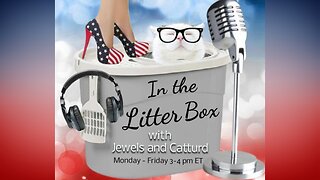Premium Only Content

Barbara O’Neill’s Health Revelations: Are We Being Poisoned by Modern Diets?
Introduction: The Truth Behind Food, Health, and Government Advice
While headlines are often dominated by celebrity drama and distractions, significant revelations about our food and health systems often go unnoticed. Barbara O’Neill, a prominent voice in alternative health, has been a staunch critic of processed foods and government-endorsed nutritional guidelines. Her warnings about the chemical additives in processed foods and their potential impact on human health have sparked debate and discussion.
This article delves into O’Neill’s claims, exploring the health risks of processed foods, misconceptions about nutrition, and the simple yet transformative steps she advocated for optimal well-being.
1. The Dangers of Processed Foods: A Chemical Cocktail
Barbara O’Neill’s assertion that processed food is “92% chemicals and 8% food” might sound hyperbolic, but it underscores a critical point: the overwhelming reliance on artificial additives in modern diets.
1. Chemical Additives in Processed Foods
• Commonly used dyes like Yellow 6, Red 40, and Green 3 are not just aesthetic choices; they are linked to carcinogenic effects, behavioral issues, and allergic reactions.
• Preservatives and flavor enhancers, while extending shelf life and taste appeal, disrupt the body’s natural processes, leading to chronic inflammation and metabolic disorders.
2. Impact on Long-Term Health
• Regular consumption of processed foods is associated with obesity, diabetes, cardiovascular disease, and cancer. The chemical load on the body over time overwhelms natural detoxification systems, leaving individuals vulnerable to disease.
3. The Psychological Manipulation of Food
• Processed foods are engineered to be hyper-palatable, exploiting the brain’s reward systems and creating addictions. These foods are not designed for nourishment but to drive consumption and profits.
2. The Salt and Water Paradox: Myths About Hydration
O’Neill’s claim that salt water is essential for health challenges mainstream warnings about salt consumption. Her perspective invites a reevaluation of hydration and mineral balance.
1. Salt as an Essential Nutrient
• The human body is approximately 58% water, and much of this is saline in composition. Salt is crucial for electrolyte balance, nerve function, and muscle contractions.
• Modern diets often demonize salt, but deficiencies in high-quality, unprocessed salt can lead to headaches, brain fog, fatigue, and muscle cramps.
2. Hydration Beyond Plain Water
• Drinking large quantities of water without replenishing electrolytes can dilute sodium levels in the body, causing hyponatremia (low blood sodium). Adding a pinch of high-quality salt to water restores balance and optimizes hydration.
3. Alcohol: The Hidden Poison
The idea that a glass of red wine a day is “healthy” has long been perpetuated, but O’Neill’s critique of alcohol’s toxic effects brings a sobering reality into focus.
1. Alcohol’s Impact on the Body
• Alcohol is a neurotoxin that kills bacteria—and cells. It dehydrates tissues, damages the liver, and impairs the gut lining, leading to long-term health consequences.
• Even small amounts of alcohol contribute to oxidative stress and inflammation, negating any potential antioxidant benefits from compounds like resveratrol in red wine.
2. Normalization of Alcohol Consumption
• The promotion of red wine as “healthy” may serve economic interests, normalizing alcohol consumption while ignoring its widespread harm. O’Neill argued that there’s no truly “safe” level of alcohol consumption.
4. Mistrusting Government Nutrition Advice
O’Neill’s warnings about official dietary guidelines highlight the disconnect between public health recommendations and optimal nutrition.
1. Demonization of Traditional Foods
• Nutrient-dense foods like meat, eggs, butter, and dark chocolate are often labeled as unhealthy, despite their long history of supporting human health.
• Meanwhile, highly processed alternatives like plant-based burgers, seed oils, and sugar-laden foods are marketed as “healthy,” despite mounting evidence of their harm.
2. The Seed Oil Problem
• Industrial seed oils (e.g., canola, soybean, and corn oil) are promoted as heart-healthy but are rich in omega-6 fatty acids, which contribute to chronic inflammation and metabolic dysfunction.
3. Raw vs. Pasteurized Foods
• Pasteurization, while increasing food safety in some cases, destroys beneficial nutrients and enzymes. O’Neill argued for the health benefits of raw milk and honey, which preserve their full nutrient profiles and support gut health.
5. The Fountain of Youth: Simple Practices for Health
O’Neill advocated for a return to natural, simple practices to maintain health and vitality. Her recommendations include:
1. Daily Sunlight
• Morning sunlight helps regulate circadian rhythms and boosts vitamin D levels, essential for immune function and mood stabilization.
2. Proper Hydration
• Drinking 2-3 liters of water daily, supplemented with salt and electrolytes, prevents dehydration and supports cellular function.
3. Sleep and Recovery
• 7-8 hours of quality sleep per night is critical for brain health, hormonal balance, and overall regeneration.
4. Whole Foods and Nutrient Support
• Prioritize a diet rich in whole, unprocessed foods. Supplement with creatine, collagen, and magnesium to support energy, muscle repair, and cellular function.
5. Movement and Exercise
• Walking outdoors and engaging in regular strength or cardiovascular exercise supports longevity and mental clarity.
6. The Larger Picture: A Controlled System?
Barbara O’Neill’s work underscores a deeper concern: are we being deliberately misled about what’s truly healthy? She argued that the modern food and pharmaceutical industries benefit from keeping populations sick, dependent, and uninformed.
1. Economic Incentives
• The processed food and pharmaceutical industries profit from the very diseases they perpetuate. Chronic illness drives consumption of medications and treatments, creating a cycle of dependency.
2. The Gatekeeping of Truth
• O’Neill’s advocacy challenges the gatekeeping of health information, urging people to question official narratives and seek out alternative perspectives on nutrition and wellness.
Conclusion: A Call for Empowerment
Barbara O’Neill’s teachings are a wake-up call to reevaluate the foods we eat, the advice we follow, and the systems we trust. While her methods and claims may be controversial, they reflect a broader truth: our health is being compromised by convenience, misinformation, and profit-driven agendas.
To reclaim control over our well-being, we must educate ourselves, prioritize natural and unprocessed foods, and adopt simple, consistent practices that align with how our bodies are designed to thrive. O’Neill’s legacy serves as both a cautionary tale and a beacon of hope for those seeking a path to true health and vitality.
-
 1:32
1:32
FragmentsOfTruth
4 days agoJapan Declares State of Emergency After 96 Million Citizens Found with Nanobots – What Happens Next?
1821 -
 LIVE
LIVE
Sarah Westall
51 minutes agoFreezing USAID & its Operations in Ukraine: A Massive Money Laundering Organization? w/ Sam Anthony
610 watching -
 DVR
DVR
Redacted News
3 hours agoBREAKING! EPSTEIN LIST INCOMING UNDER AG PAM BONDI? DEMOCRATS FREAKING OUT, PRINCE ANDREW NERVOUS
104K129 -
 52:02
52:02
Candace Show Podcast
6 hours agoBecoming Brigitte: An Inaccessible Past | Ep 2
84.5K114 -
 LIVE
LIVE
2 MIKES LIVE
4 hours ago2 MIKES LIVE #176 News Breakdown Wednesday!
165 watching -
 LIVE
LIVE
I_Came_With_Fire_Podcast
5 hours agoGAZA TAKEOVER | USAID EXPLAINED | TARIFF TAKEDOWN
413 watching -
 LIVE
LIVE
The Based Mother
5 hours agoFULL OF IT! Crooked politicians say they care about children. Their actions tell a different story.
108 watching -
 1:54:12
1:54:12
Right Side Broadcasting Network
8 hours agoLIVE: President Trump Signs EOs; Pete Hegseth Meets with Netanyahu - 2/5/25
99.7K45 -
 1:51:41
1:51:41
Dr. Drew
6 hours agoPsychics Investigate DC Black Hawk & Philadelphia Medical Plane Crashes w/ Zach Vorhies + Eddie Conner & Andrew Anderson – Calling Out w/ Susan Pinsky – Ep 166
55.9K17 -
 1:03:04
1:03:04
In The Litter Box w/ Jewels & Catturd
23 hours agoDemocrats Come Unglued | In the Litter Box w/ Jewels and Catturd Ep. 735 - 2/5/2025
68.4K63